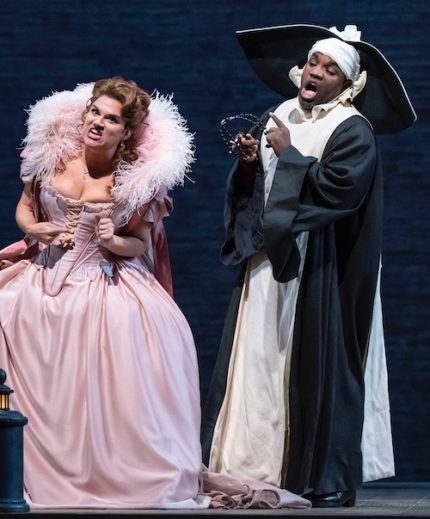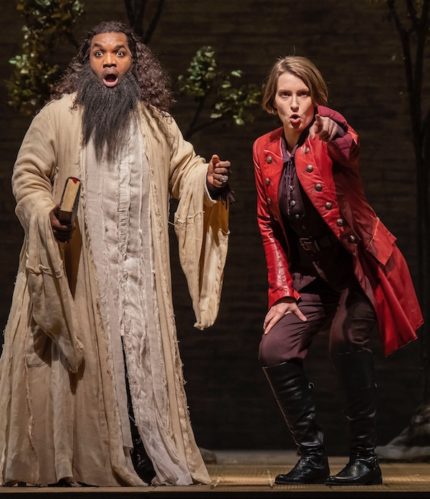Stylish singing, only fitful funny in Lyric Opera’s “Le Comte Ory”

It may seem the epitome of critical churlishness to complain that a performance of an opera in which the lead male character and his cavaliers masquerade as nuns is too silly.
But Lyric Opera’s production of Rossini’s antic Le Comte Ory, which opened Sunday in a matinee performance, showed that the company still can’t do comedy well. Unfortunately, as demonstrated last week with Verdi’s Don Carlos, Lyric is not doing drama very well these days either, which doesn’t leave a whole lot.
The vocal side of Rossini’s opera—the second French opera by an Italian composer to open in the past week—was largely well served with stylish singing by a solid cast, presented in an imaginative production. Yet genuine laughs were few in a performance that tried far too hard to be amusing.
Not like the scenario isn’t farcical enough. Set around the year 1200, Count Ory plots to gain entry to Formoutiers Castle in order to seduce the beautiful but virtuous Countess Adèle. The licentious count is posing as a charlatan holy man and spiritual advisor, dispensing romantic advice to the gullible local townsfolk. Isolier, Ory’s page, is in love with Adèle and tells Ory of his plan to gain entry to the castle disguised as a pilgrim—a ruse the Count immediately decides to adopt for himself and his cavaliers. (Conveniently, all the husbands and brothers of the women in the castle are away at the Crusades.) Despite the Count’s best efforts, Adèle’s virtue remains intact, Ory is banished from the castle, and the knights return for a joyful reunion with their wives and sisters.
The scenario may be a slender reed even for a comedy but Rossini’s music—much of it excavated from the composer’s withdrawn Il viaggio a Reims—is wholly delightful, and spirited and infectious in the composer’s best buffa style.
Lyric has borrowed director Bartlett Sher’s production from the Metropolitan Opera. The scenic design by Michael Yeargan deftly makes art out of artifice by presenting the opera as a play within a play—staged in a wooden 18th-century theater with storybook castle walls and rustic machinery.
The scenic conceit is atmospheric and eye-catching, especially the elegant candlelit castle chamber for Act II. Less successful is the addition of a silent “courtier” who is presumably the director/stage manager for the show within a show. Unfortunately, the actor is too often miles over the top in his silly-ass muggery and shtick. Omnipresent nearly throughout the performance, this unnecessary character’s presence quickly becomes tiresome and irritating.
Which bring us to the primary problem with this Comte Ory—it simply isn’t very funny.
Revival director Kathleen Smith Belcher is one of those who seems to believe that the way to present an operatic comedy is to insert all kinds of slapsticky business, have the cast mug outrageously and do everything in as broad and over-the-top a manner as possible. (See Lyric Opera’s hapless 2015 Le nozze di Figaro.)
What Belcher and her ilk fail to understand is that silly doesn’t automatically equal funny. Nor does crass vulgarity as with the ménage à trois gyrations and lolling about in Adèle’s bed, which only served to undermine the sublime Act II trio.
Ultimately, the wit and musical sophistication of Rossini’s score was poorly served by the inept stage direction. The low-brow excesses were all too typical of a performance that was short on genuine laughs for all its would-be madcap hijinks.
Lawrence Brownlee started out rather dry-toned in the title role but soon warmed-up, easily throwing out top notes and handling Rossini’s rapid-fire vocal lines with typical flexibility and panache.
The high-voiced tenor has displayed an assured comic touch in previous local appearances, most notably Lyric’s 2019 Barber of Seville. While there were some amusing moments, Brownlee’s Count Ory didn’t seem quite settled Sunday—oddly for one of the singer’s signature roles. His performance felt like a work in progress that had yet to find a convincing balance between comedy and vocalism.
A world-beater Queen of the Night in Lyric’s 2016–17 Magic Flute, Kathryn Lewek possesses the coloratura soprano and stratospheric top notes for the role of Adèle. While her vocalism was consistently assured, Lewek was less successful with the ill-advised attempt to make a broadly comic character out of what is the opera’s “straight man” role. Her satirical grand manner and exaggerated physical gestures when singing florid passages only served to muddle the character.

The finest overall performance of the afternoon was delivered by Kayleigh Decker in the trousers role of Isolier. The tall mezzo-soprano, a Ryan Center alum, sang with easy fluency and even tone, wholly embodying the energy and adolescent swagger of the page who is besotted with Adèle. More than most in the cast, Decker managed to keep her character in focus despite being handicapped by the knockabout direction.
Joshua Hopkins was indisposed Sunday as Raimbaud, and Ian Rucker made an impressive company debut subbing as Ory’s friend and partner in crime. The towering singer, an Oshkosh native and first-year member of the Ryan Opera Center, showed a firm baritone and relaxed confidence on stage, capably delivering Raimbaud’s comic narrative of his raiding of the castle’s wine cellar.
Mirco Palazzi made a worthy company debut as Ory’s nameless, long-suffering Tutor, bringing an agile and resonant, if rather lightweight, bass to the proceedings.
Mezzo Zoie Reams was a rich-voiced and imposing presence as Ragonde, Adèle’s concierge and factotum. First-year Ryan Opera Center member Lindsey Reynolds showed a pleasing soprano as Alice.
Enrique Mazzola seems more at home in opera buffa than in the blood-and-thunder drama of Don Carlos. Even so, one often wanted fleeter tempos and more spirited effervescence coming from the pit under the company’s music director. Yet vocal lines were admirably clear and Rossini’s complex multi-lined ensembles bracing and vital.
The ensemble has a prominent role to play in this opera, and the men and women of the Lyric Opera Chorus acquitted themselves very well indeed—singing superbly under the direction of chorus master Michael Black and acting characterfully in their various guises. The men, especially, provided one of the show’s rare moments of genuine hilarity with their energetic but misbegotten Terpsichorean moves as carousing, wine-guzzling cavaliers masquerading as nuns.
Le Comte Ory runs through November 26. lyricopera.org
Posted in Performances





Posted Nov 15, 2022 at 1:51 pm by John
I agree that the production was far too slapstick in nature. But it was worse than it had to be. The original Met production (available on YouTube) was less broad (though it had the incomparable trio of Florez, Damrau and DiDonato) and lacked as much mugging. The last act bedroom scene, for example, was much less nuanced here and detracted from the stunning music.
I disagree about some of the singing. Kayleigh Decker was seriously underweight for her role, and both of the lower male singers were misuited to theirs. It’s just typical of the poor casting we now get at the Lyric. The entire performance seemed like a rehearsal instead of a performance.